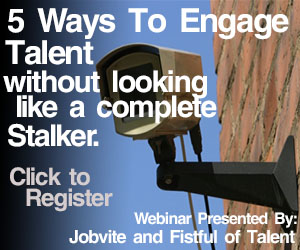WEBINAR: Engaging, not stalking - or how to make eye contact without looking like a maniac
It is pretty easy to toss around phrases like 'HR is the new Marketing' and 'Recruiting is really just sales'. Those chestnuts have been the topic and title of many a blog post, conference presentation, and yes, webinar. But it is a lot harder to think, act, and execute like a marketer that has to find, attract, nurture, and close prospects than it seems on the surface. But fear not my friends, help is on the way to help you amp up your talent attraction efforts and get you executing like the best Madison Avenue big shots.
The gang at Fistful of Talent are back, this time with my friends, (and 'Awesome New Technolgies for HR' selection), from Jobvite for the latest FOT Webinar titled '5 Easy Ways For Recruiters to Engage Talent Pools – Without Looking Like Complete Stalkers' to be presented on October 3, 2013 at 1:00PM EDT.
Sign up for the FREE webinar and the gang at FOT will hit you up with the following:
- A simple definition of what a talent pool is, how you organize it in your ATS, and how to manage the concept of “opt-in” to the people you include in that talent pool. The definition of who gets included and “opt-in” is important, because you’re gong to broadcast a bit over time– which will feel different (in a good way) to candidates included in the talent pool.
- A checklist of information you already have access to in your company that those passive talent pool candidates would love to hear about. It’s a checklist! All you have to do is go find the info we list and you’re golden.
- Data on best practices in thinking like a marketer (do you use email, LinkedIn, snail mail, text, etc.) to engage your talent pool – without looking like a stalker.
- Grand Finale, we’ll deliver the top 5 ways to engage talent pools – and for each engagement method, we’ll list what the communication looks like, where to find the information and why doing it the way we recommend is the best practice
And as a Special Bonus the crew will give you a monthly calendar of what to do and when to do it related to our list of 5 ways for you to engage your talent pool. It couldn’t be simpler than that.
It’s time to make the talent pools you’ve built in your ATS actually like you and your company. Join FOT and Jobvite on October 3, 2013 at 1pm EST, “5 Easy Ways For Recruiters to Engage Talent Pools – Without Looking Like Complete Stalkers” and they will show you how.
REGISTER HERE:

 Steve
Steve


